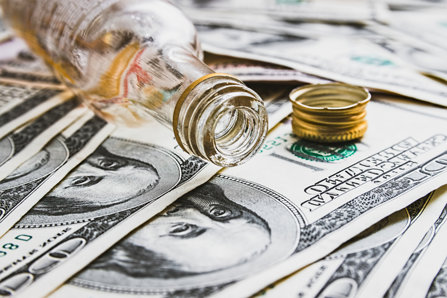
- HOME
- ABOUT US
- WHAT WE DO
- SUBSTANCE
USE PREVENTION - NUTRITION
EDUCATION - HEALTHY FOODS
FOR THE COMMUNITY
- SUBSTANCE
- HOW WE CAN HELP
- NEWS & EVENTS
- GET INVOLVED
Blog
April 13, 2023
The Cost of Alcohol

Alcohol can be costly in many ways, with research showing that excessive drinking affects many aspects of the drinker’s life and the lives of those around them, as well as costing their state and country.
Research completed in 2010 showed that the cost of excessive alcohol use in the United States was $249 billion, and in Maine alone there was found to be a total cost of $938.7 million; this comes out to be $707 per person in Maine, or $1.58 per drink. These physical costs were results from losses in workplace productivity, healthcare expenses for treating problems caused by excessive drinking, law enforcement and other criminal justice expenses, and losses from motor vehicle crashes related to excessive drinking.
If that doesn’t put it in perspective, out of the $249 billion in the United States that is loss to excessive drinking, $25 billion of that goes to law enforcement and other criminal justice expenses, and $13 billion loss from motor vehicle collisions. That is $38 billion dollars of tax revenue going towards expenses caused by excessive drinking that otherwise could have been prevented.
These are the costs that we don’t typically think or talk about when considering excessive drinking, but cutting down on drinking habits will not only cut down costs in your personal life, but also in your community. What are ways you can do that? Adults of legal drinking age can choose not to drink or to drink in moderation by limiting intake to 2 drinks or less in a day for men and 1 drink or less in a day for women, and sometimes not drinking at all may be the best option for some people. Also, consider reflecting on your relationship with alcohol and recognize any signs that may indicate a problem:
• Are you unable to limit the amount of alcohol you drink?
• Have you been wanting to cut down on how much you drink or make unsuccessful attempts to do so?
• Do you spend a lot of time drinking, getting alcohol, or recovering from alcohol use?
• Do you feel a strong craving or urge to drink alcohol?
• Do you fail to fulfill major obligations at work, school or home due to repeated alcohol use?
• Do you continue to drink alcohol even though you know it’s causing physical, social, work, or relationship problems?
• Have you reduced your social and work activities and hobbies to use alcohol?
• Do you use alcohol in situations where it’s not safe such as driving?
• Have you developed a tolerance to alcohol so you need to drink more to feel it’s effect or you have a reduced effect from drinking the same amount?
• Do you experience withdrawal symptoms, such as nausea, sweating and shaking, when you don’t drink, or are you drinking to avoid these symptoms?
The costs of excessive drinking are high, but they don’t have to be. Responsible drinking, or not drinking at all, has a positive impact on our economy, and in our personal lives. Help and support is available, visit https://www.aa.org/find-aa to find an AA meeting near you, or call 211 to find additional resources near you.
For more information about the signs of alcohol use disorder: https://www.mayoclinic.org/diseases-conditions/alcohol-use-disorder/symptoms-causes/syc-20369243
For more information about alcohol use and the economy: https://www.cdc.gov/alcohol/features/excessive-drinking.html
 MCD Global Health
MCD Global Health